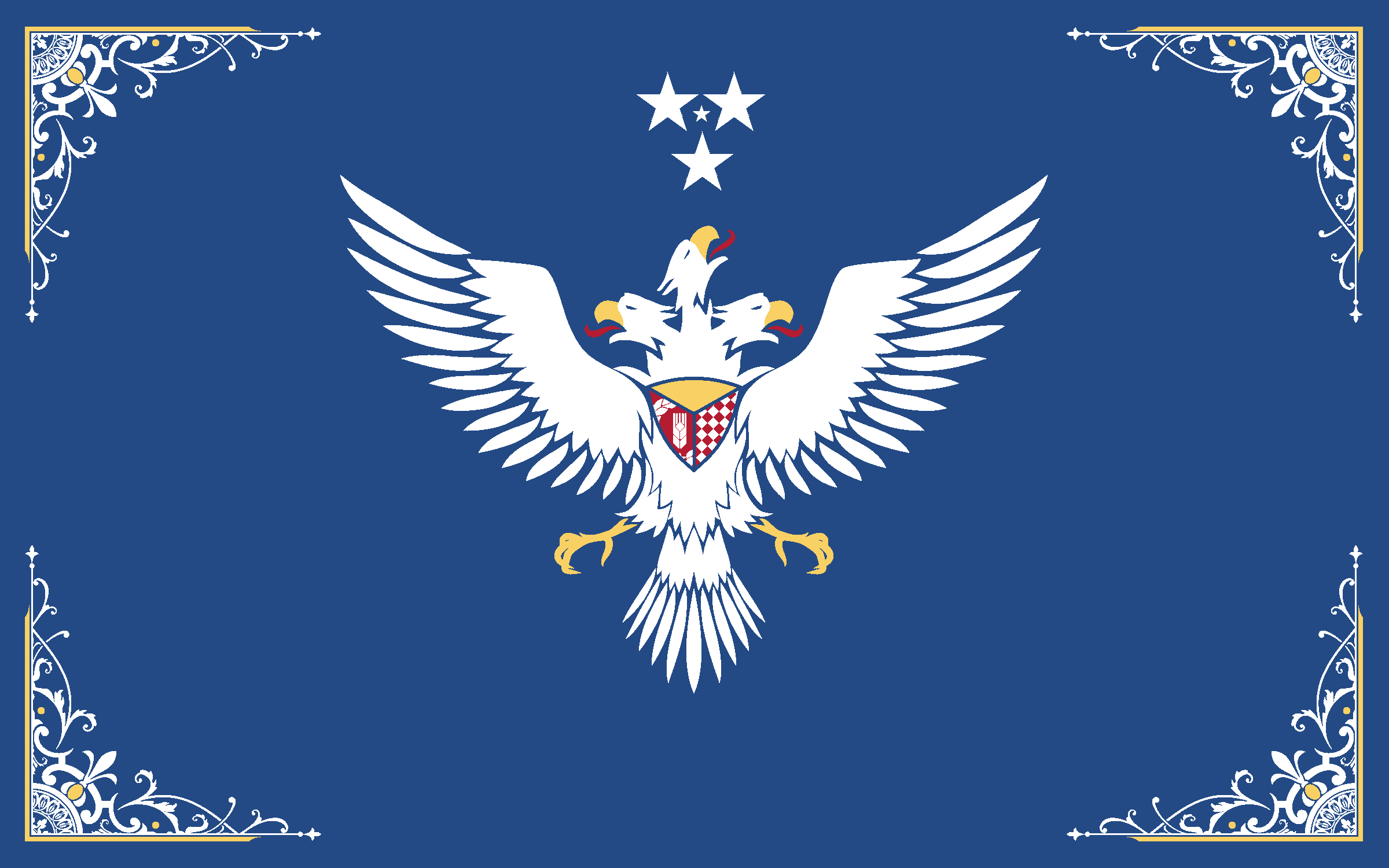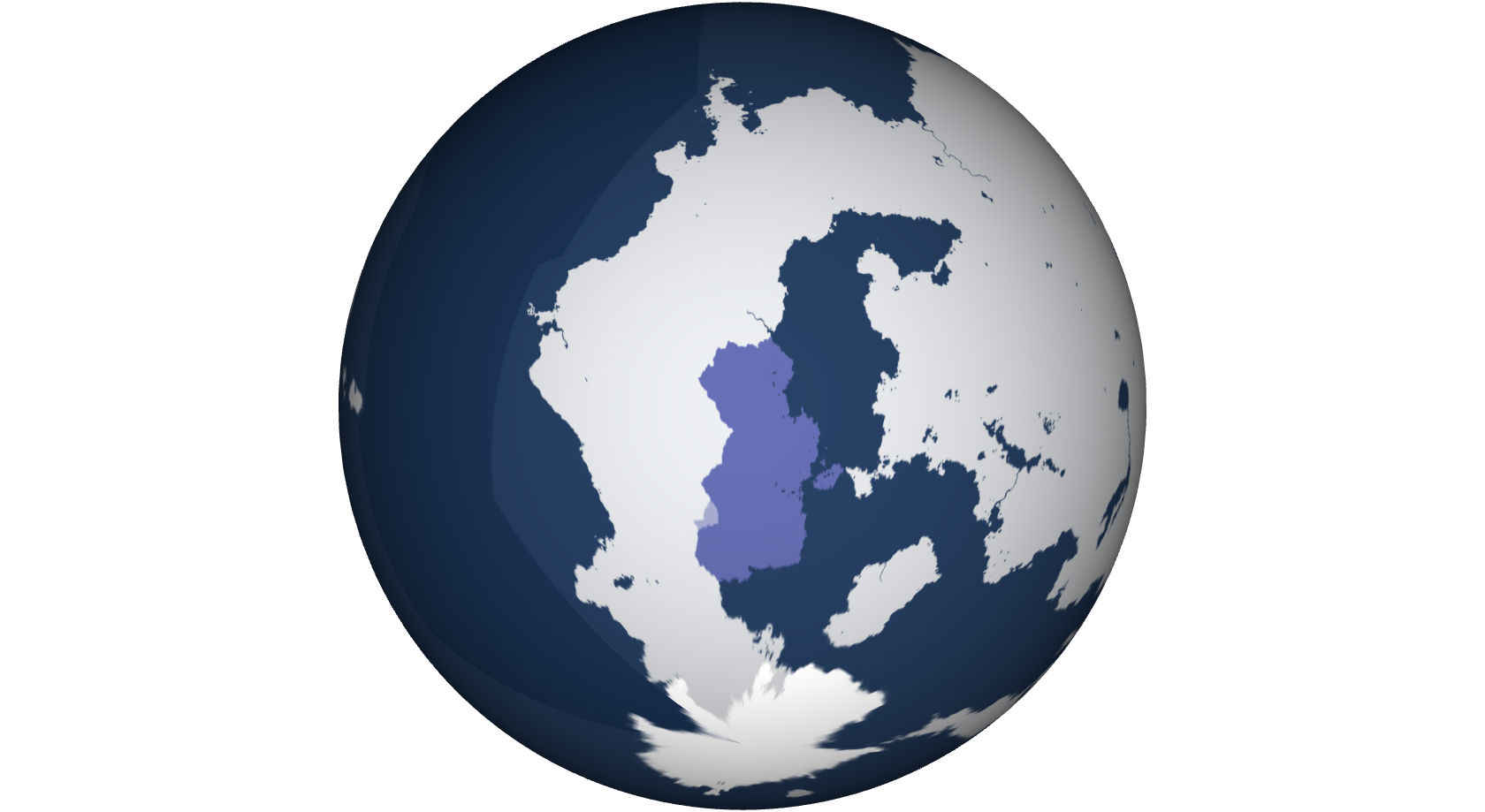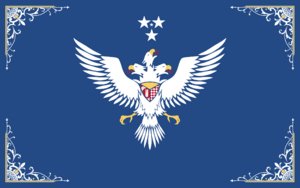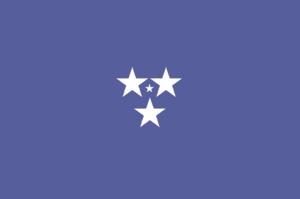Fortis
|
United Federal Republic of Fortis
Фортис Република Савезна (Fortis Savezna Republika)
|
|||||
|---|---|---|---|---|---|
 |
|||||
| The Three Large Stars of Fortis on the Fortis Eagle Emblem, With the old flags of Laythia and Troakia inlaid amongst a golden shield. | |||||
| Motto | "Svetlucavo more" - A Shimmering Sea | ||||
| Common Name | Fortis | ||||
| Anthem | Završetak Ponoson - A Prideful Finish | ||||
 |
|||||
| Demonym | Fortisian | ||||
| Official languages | Laythi, Kalbanian, West Hook Pidgin (Veiid Zokesian, Laveskan) | ||||
| Currency | Fortis Stotinu or Stotinu | ||||
| Politics | |||||
| Capital | Fedithe F.O. | ||||
| Government | Federal presidential constitutional republic | ||||
| President | Tedior Roovich | ||||
| Preceded by | Laythia and Troakia | ||||
| Demography | |||||
| Ethnicities | Kalbanian, Laythi, Zokesian, Others (less than 5%) | ||||
| Population | 14,446,614 | ||||
| Area | 47,769 km² | ||||
Fortis, Officially the Federal Republic of Fortis, is a protectorate of the UIF and a union state formed from the binding of two nations, Laythia and Troakia. Fortis was born from the collapse of Laythia, after the communes began to fail spectacularly, and communalist thought fell out of favor for more moderate democratic ideals. Seeing the oncoming collapse, Troakian and Laythian nationalist leaders, especially those more clued into world politics, saw the writing on the wall. Coming together, they formed the Pact of Fortis, or the Pact of Strength, a unilateral and bi-partisan treaty first allowing for some stabilizing measures in both countries. These measures would eventually come to a head in late 2134, when both nations dissolved their formal and previous governments. This made way for the new nation of Fortis, formed the same year from both countries.
On the History of Fortis
The “Downturn Era”
The economic downturns that are oft seen in Veiid and the Kalbans eventually ground down the Laythian Communes to near depression. Multiple recessions to the north had also devolved Troakia into near dissolution. The bleak outlook, especially from the more economically conservative think tank “Фортис Унилатерал Ецономиц Цоммиссион”, or The Fortis Unilateral Economic Commission, warranted extreme measures to combat what seemed to be a rapid downfall into an unrecoverable depressed economy. The commission, a group of 100 staffers and economists based out of Fedithe (Which readers will recognize as the now Capital, Federalni Okrug, Fedithe or Fedith F.O.), proposed a series of cultural, economic, and even political reforms that, to the average Laythian citizen, would have seemed outrageous – a reorganization of the communes into more capitalistic towns, cities, counties, and metropolitan areas, and even a proposal to make cultural and diplomatic ties with the neighboring Troakia. However, with desperation settling in and food riots becoming more common, the inter country governments and municipalities, perhaps to the surprise of the ordinary citizen, ultimately approved the effort. A large, countrywide vote was placed, and the reorganization, taking place between 2126-2130, went forward. Similar reforms began to take place in Troakia, and by 2132, both countries established the Fortis Pact.
The Fortis Pact
The Fortis Pact established a number of goals for both the Laythian and Troakian Interim governmental system to meet, including a number of public works overseeing infrastructure projects, healthcare reforms, and trade reforms. A number of tariffs held on Kalban goods were instituted, as no overt government was in place in the Kalban region to formally protest. With no real possibility of a trade war over Kalban goods, and with no pre-existing tariffs on goods from other Baskay area countries, the economic downturn at first slowly reversed itself. The Fortis Pact Public Works program, overseeing the demolishing and reconstruction of multiple ports throughout the area, as well as the rapid reindustrialization of the region thanks in part to the newly established Fortis Heavy Industries and Redoubt Energy Systems, led to a skyrocketing revitalization of the economies of both Laythia and Troakia. By 2134, the lines between Troakia and Laythia, despite prior tensions, had blended so considerably that the nation of Fortis would be established in a formal dissolving of the prior governments.
The UIF Era
“A member in name only, woe, how it is to be a mere protectorate!” - Tediore Roovich, quoted in 2155, President of Fortis as of 2163-2182, then leader of the Hook Seariders, 1st Battalion, 7th Regiment.
By no means a secret, if not outright stated in current Fortisian diplomatic missions, Fortis considers itself a regional power with a vested interest in securing the Lesser Baskay and the Kalbans. Public interest in keeping the region peaceful and clean have remained high throughout the existence of the Veiidic country. As a result of this, Fortis found itself at odds in the late 2150s with the now defunct New Kalban Republic, and some tensions also existed to the far north with the nation of Belka. A near civil war had also broken out when, despite an oddly well-functioning economy, a royalist faction, claiming ownership of the country, led a number of raids across northern Laythia, but ultimately were destroyed. Seeing the incredible restoration of the UIF two years earlier in 2150, Fortisian leaders began to think about methods of application into the union as a member state. The UIF was a stable entity, and as it had many like-minded policies, membership was seen as an achievable goal. However, certain cultural ideals, especially in regards to a distaste to answering fully to a military command so far away, led Fortis down another path – entrance as a limited protectorate. As the UIF also did not particularly want a direct member state in the historically unstable Veiidic region, much less the Kalbans themselves, having a junior partner that couldn't directly cause them trouble was a much more reasonable choice. In such a state, Fortis would not be beholden to UIF command, but would also not gain complete backing by UIF forces. However, by providing West Hook Island’s Sea Command and Squadron (WHI-SEARON) facilities on a “political” lease to the UIF (where the UIF would not pay upkeep), as well as to the allied nation of Zokesia, Fortis gained a near guaranteed, friendly, and relatively like-minded ally in its back pocket. Ultimately, Fortis applied to become a UIF Protectorate, and was later granted the position in the late 2150s. Today it remains as such, and though critics like former president Tedior Roovich abound, even those with a critical eye like Roovich himself admit that the shame of being partially under the thumb of the UIF has remained well worth the benefits. As a result of having two enormous power-blocks giving guarantees of protection, the NKR was not able to formulate any military in-roads into Fortis, and in fact had to rely on Fortisian money to keep itself solvent before ultimately collapsing again. Other nations around Veiid and the Baskay were also, thankfully for the populace of Fortis, cowed away from any land grabs. In the intervening years, the tensions in the Former NKR and other Veiidic region countries have thankfully cooled, and as a result, the region, for now (2199), remains stable.
Roovich's Presidency
Perhaps one of the most well beloved figures of recent Fortisian history is the now former President Tedior Roovich, elected in a 2-1 lead in 2163. Not long after the entrance of Fortis into the UIF as a protectorate under Former President Yelvin Yilo, Roovich, a larger than life figure known for his old-timey habits and showmanship, established the Fortisian National Park System, and instituted a number of reforms that took some autonomy away from the provinces in return for returning more stability to those regions. Roovich also reformed the Fortisian Ground Patrol force into the larger and better equipped Fortisian Army, and expanded multiple infrastructure products to rural areas instead of just the larger metropolitan areas.
In the case of the state of North Laythi and Zerban, the establishment of the national park system led to the clean up of many old war sites, as well as the construction of so called "superfund" sites that poured hundreds of thousands of Stotinu into cleaning up the area. Now, decades later, former sites of debris from meteor damage as the result of centuries old impacts (mostly from the the years of slow bombs thrown around kerbin), as well as many other hazardous waste sites, are now clean and enjoyable by visitors. The majority of waste was processed and sent to a high-security North Laythi site specialized in storage of volatiles and nuclear waste. Roovich's initial policies were not well received, but the near-immediate results (with life returning to the former damaged areas within months), resulted in a near 90% approval rating, the highest ever seen in a Fortisian President.
Roovich's can-do attitude, his continued insistance on maintaining a professional military (but refraining from hostile acts), have endeared him to the region. As of 2200, he currently sits as the chairman of the board for the Fortisian Veiidic and International Relations (VIR) Think-tank.
Leaders
Fortis
Flags

Government
Fortis has a unicameral legislature, modelled off of other past and present Federal Republics, but maintains a very strong "Personal and Individual" attitude towards rights, with local areas receiving a great deal of autonomy, such as the ability to decide at the local level on the legality of Drugs, Alcohol, and other contentious items. There exists a Supreme Court, which decides at the national level on cases that may affect the entire nation, an Executive branch, which includes the President and his cabinet of advisors, and a Senate, comprised of representatives of local provinces, which vote on various national level laws.
At the local level, Provinces maintain a high degree of authority, but can in some cases answer to the Federal Government, such as with the Right to Bear Arms, or the Right to Free Speech and Press.
Economics
Fortis, especially the former Laythian region, maintains high autonomy politically, but due to the failure of the commune system, the nation runs on a capitalistic economy, with private firms held by private citizens the rule of thumb for buisiness. However, certain industries remain nationalized, such as healthcare (though private clinics and insurance, though highly regulated, do exist). Fortis is not a high-GDP nation, but remains stable, with economic policy firmly entrenched in goals of stability rather than production.
Exports from Fortis are mostly maritime, with heavy shipbuilding as a major industry. Imports mostly include food, medicine, and consumer goods.
Foreign Policy
The Foreign Policy of Fortis has been set by nearly every one of its administrations as having one single overarching goal - stabilize the inner region. Multiple wars, upsets, and other incidents have taken a generational toll on the population of the country, and being tired of near constant wars, economic downturns, famines, and other disasters, have led to a near universal policy of "Stability first". As a result, the Fortisian Military has had a historically defensive doctrine, but has a large rapid logistics base, especially amongst the Fortisian Coastal Relief service, which focuses both as a coast guard and a regional disaster relief organization. With the Fortisian takeover of former NKR lands, this general mandate has become increasingly strict and widespread.
Religion
Though Fortis has no official state religion, a strong orthodoxy and patriarchal value exists in the form of the Veiidic-Baskayn Church, which has only become more powerful as time marches on. The ideals, however, of “What is Vikus's belongs to Vikus, and what is God’s belongs to God”, keep the Baskayn Religion firmly separated from government matters. Religious tensions between citizens of Fortis and their southern neighbors, however, has steadily increased over the last decade, and more secular analysts worry that religious and ethnic tension will result in the next yugo-veiid or kalban war.
Culture
By And Large, Fortis is dominated mostly by the Yugoveiidic culture it has inherited from Laythia, Troakia, and the Kalbans.
Fortis is by no means a melting pot, but besides the strong Yugoveiid culture of the Laythi and the Kalbanian ethnic groups, it has a growing appreciation for (and small but growing population of) Laveskan and Zokesian culture present on West Hook Island. A statistically large amount of Laveskan and Zokesian settlers live on West Hook Island, as the well developed seaport there leases multiple slipways and air hangars for those respective countries (as well as the UIF itself, Laveskan majority not withstanding)
States
South Laythia
Bordering the Greater Baskay, South Laythia is also the current seat of the government, with the capital Fedithe F.O. located on its shores. The state was formed from the regions of Awethenia, Fedithe, Okal, Kardagiv, and Ulkam, and is one of the most populous regions in the country.
North Laythia
Formed from Medsous, Karka, Dzeuthe, and Laythi. Often called "The old country", with rich history and ancient castles that have been unfortunately nearly completely raised by the hundreds of years of war that the region has seen. The region itself is mostly agrarian, save for the coastal areas.
Troakia
The former country of Troakia, now a province in Fortis. It's regional capital is the Former Troakian Capital Zerban. Provinces include Zerban, Camalis, and Kosna, with the high autonomous regions of Ceno, Dolinia, and Sokovo, former NKR regions, under its nominal control. The region has been highly unstable for years, and often receives food aid from the Laythian regions.
West Hook Island
No stranger to the changing of hands, West Hook joined Fortis alongside Troakia, then nominally a part of it, and is responsible for a great deal of Maritime related industry. The island, with the city of Kuka on it's northern shore, is perhaps the least economically impacted and most resilient part of the nation.
NKR Redevelopment Zone
To the north of Troakia lies the NKR redevelopment Zone. Not much is publicly known, only that Fortis has a vested interest in redeveloping the area. Fortisian officials maintain that the region will be granted independence when it can guarantee itself as a sovereign entity again.
Industry And Commerce
General Overview
Fortis spends a considerable amount of money on the research and development of both military and civilian sector in underwater vehicles. Fortis maintains a decent, but not top class aeronautical industry, and has a small but well funded space center capable of launching mid-grade rockets. Other non-notable consumer oritented heavy industry is spread throughout both the former Laythia and Troakia. Fortis has also recently increased research and development into it's space sector, with planned expansions to the space center slotted for the 2200's.
Major Companies
Fortis is home to a number of large companies and conglomerates, but few operate on an international scale. Included are any known companies that are regionally or internationally known, such as Airlines, Sea Services, and Major Industrial Concerns.
Military Branches of Fortis
The Baskajska Mornarica, the naval department of the Fortisian Military, was established in 2134 alongside the state itself, and has a mandate of preventing piracy and war on the Baskay. Force projection as an ideal simply does not exist for the small maritime force, who has only a single, small escort carrier, the Forrester ("Форрестер"), meant for rapid deployment of air wings around the Baskay rather than for force projection around the world. The Navy's newer operating principal of "unseen threat" as part of its overall defensive doctrine has lead to the rapid procurement of submarine task forces. Sonobouys line the coasts around Fortis as a result, and the Navy maintains a small detachment of destroyers and even fewer cruisers as a result.
The Fortisian Army
The Fortisian Army is a small, well funded, defensively oriented force that maintains a number of first rate combined arms battalions. Originally, the Army was organized as the Fortis Ground Patrol Force, which was more akin to a Ground Self Defense Force, and could not easily prosecute wars, only internal defense.
Fortis Air Forces
The Fortis Air Force is a small but well funded one that relies heavily upon rotor-wing craft to patrol a small area. Fixed wing fighters exist in the form of QRF-oriented Multi-role Strike fighters and ground attackers. Light fighters imported from Zokesia can be pressed into service in dire straights, but are reserved for the FAF's Consolidated Air School in Laythi, which trains both FAF and B.M. Aviators.
Fortis Coastal Relief Service
Formed as the result of multiple disasters on the Minor Baskay with little to no help from other nations, the FCRS functions mainly as a relief service, but has a number of cutters that do provide coastal security. The majority of anti-piracy and anti-smuggling services, however, are provided by the Baskajska Mornarica.


